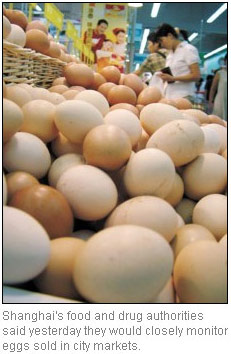
Shanghai's food and drug authorities said yesterday they would closely monitor eggs sold in city markets.
The move follows the news that Hong Kong food inspectors found eggs imported from northeast China to be tainted with industrial chemical melamine.
The Hong Kong government announced on Saturday excessive levels of melamine were found in one brand of mainland eggs.
The extra-large "Select Fresh Brown Eggs" imported from the Dalian Hanwei Enterprise Group were found to have nearly twice the legal limit of melamine.
Gu Zhenhua, an official from the Shanghai Food and Drug Administration, said the organization was ready to take effective measures.
Gu said the city's latest tests showed that more than 95 percent of eggs in local markets met the standards, according to xinmin.com. But he didn't specify whether a melamine scan was a procedure in routine testing on eggs.
The lion's share of fresh eggs in local markets come from city suburbs and farms in Jiangsu and Zhejiang provinces, according to Gu.
Some local supermarkets which bought eggs from the Hanwei Group are still selling them as they have not received official withdrawal notices.
Hu Minghua, an official with Wal-mart China which sells Gegeda eggs from the Hanwei Group, said: "We will keep close track on the development of the case."
"After experiencing so many milk, candy, and biscuit scandals caused by melamine, local citizens have been mature and rational enough to know that even the same product has different batches, suppliers and manufacturing places," Hu said.
Hong Kong's Secretary for Food and Health, York Chow, said on Sunday that Hong Kong would check all eggs imported from the mainland and would expand testing to meat and offal products.
"Since some animal feed used on the mainland might have been polluted by melamine, our tests will focus more on meat imported from the mainland," Chow said.
Hong Kong citizens consumed about 1.6 billion eggs each year, Chow said. Eggs imported from the mainland accounted for about 60 percent of the Hong Kong market.
The General Administration of Quality Supervision, Inspection and Quarantine had strengthened melamine tests on eggs exported from the mainland from the end of September, Young Kam-yim, a spokesman of the Hong Kong Egg Merchants Association, told Yangcheng Evening News.
However, from the middle of October, eggs imported from the mainland to Hong Kong were clear of melamine, Young told the newspaper.